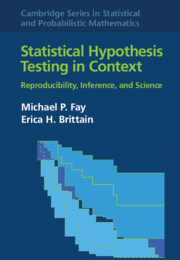Book contents
- Frontmatter
- Contents
- Preface
- 1 Introduction
- 2 Theory of Tests, p-Values, and Confidence Intervals
- 3 From Scientific Theory to Statistical Hypothesis Test
- 4 One-Sample Studies with Binary Responses
- 5 One-Sample Studies with Ordinal or Numeric Responses
- 6 Paired Data
- 7 Two-Sample Studies with Binary Responses
- 8 Assumptions and Hypothesis Tests
- 9 Two-Sample Studies with Ordinal or Numeric Responses
- 10 General Methods for Frequentist Inferences
- 11 k-Sample Studies and Trend Tests
- 12 Clustering and Stratification
- 13 Multiplicity in Testing
- 14 Testing from Models
- 15 Causality
- 16 Censoring
- 17 Missing Data
- 18 Group Sequential and Related Adaptive Methods
- 19 Testing Fit, Equivalence, and Noninferiority
- 20 Power and Sample Size
- 21 Bayesian Hypothesis Testing
- References
- Notation Index
- Concept Index
17 - Missing Data
Published online by Cambridge University Press: 17 April 2022
- Frontmatter
- Contents
- Preface
- 1 Introduction
- 2 Theory of Tests, p-Values, and Confidence Intervals
- 3 From Scientific Theory to Statistical Hypothesis Test
- 4 One-Sample Studies with Binary Responses
- 5 One-Sample Studies with Ordinal or Numeric Responses
- 6 Paired Data
- 7 Two-Sample Studies with Binary Responses
- 8 Assumptions and Hypothesis Tests
- 9 Two-Sample Studies with Ordinal or Numeric Responses
- 10 General Methods for Frequentist Inferences
- 11 k-Sample Studies and Trend Tests
- 12 Clustering and Stratification
- 13 Multiplicity in Testing
- 14 Testing from Models
- 15 Causality
- 16 Censoring
- 17 Missing Data
- 18 Group Sequential and Related Adaptive Methods
- 19 Testing Fit, Equivalence, and Noninferiority
- 20 Power and Sample Size
- 21 Bayesian Hypothesis Testing
- References
- Notation Index
- Concept Index
Summary
In this chapter we begin with definitions of standard missing data assumptions: missing completely at random (MCAR), missing at random (MAR), and missing not at random (MNAR). Under MNAR, the probability that a response is missing may depend on the missing data values. For example, if the response is death, if individuals drop out of the study if they are very sick, and if we do not or cannot measure the variables that indicate which individuals are very sick, then that is MNAR. In the MNAR case, we consider several sensitivity analysis methods: worse case imputation, opposite arm imputation, and tipping point analysis. The tipping point analysis changes the imputed missing data systematically until the inferential results change (e.g., from significant to not significant). In the MAR case, we consider in a very simple case models such as regression imputation and inverse probability weighted estimators. We simulate two scenarios (1) when the MAR model is correctly specified, and (2) when the MAR model is misspecified. Finally, we briefly describe multiple imputation for missing data in a simple MAR scenario.
- Type
- Chapter
- Information
- Statistical Hypothesis Testing in ContextReproducibility, Inference, and Science, pp. 326 - 341Publisher: Cambridge University PressPrint publication year: 2022



